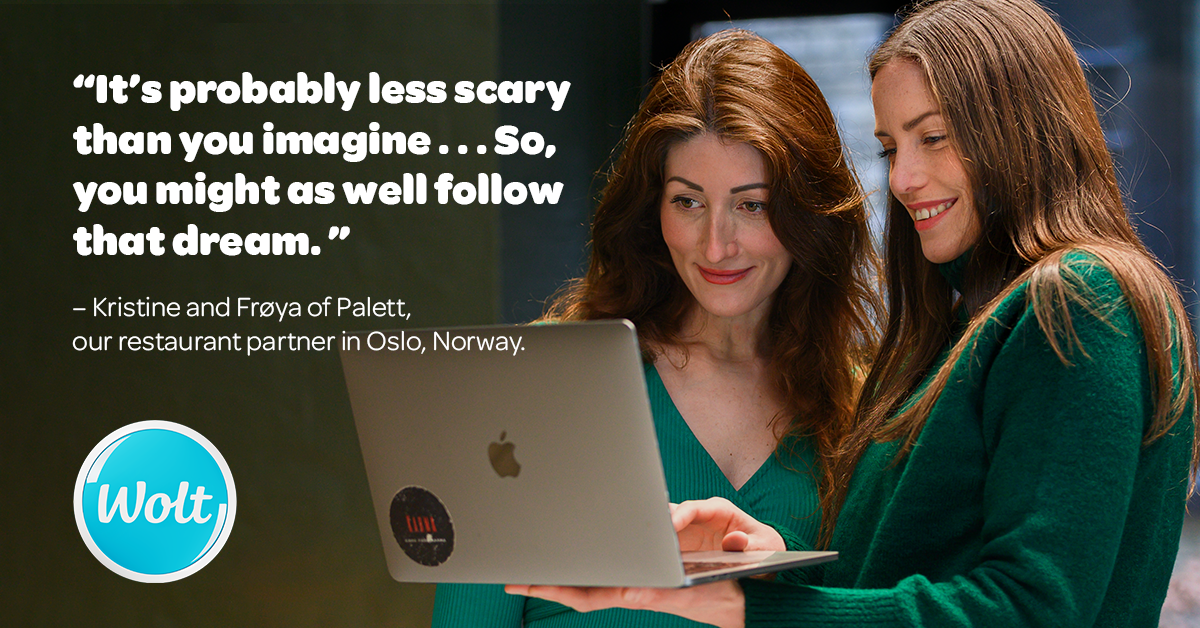Wolt Merchant Stories: Frøya Hetzel and Kristine Bakk of Palett, Norway

Many successful startups are born out of a personal need. What didn’t sit well with Frøya Hetzel Solheim and Kristine Bakk, the two co-founders and CEOs of Palett, was the virtual impossibility to have an affordable healthy meal during a busy work day in Oslo, the Norwegian capital.
Right from the start of the Covid pandemic – not the best of circumstances for the hospitality sector as a whole, the two young women managed to create a new business model, innovating their way into the consumer market for ready meals.
By now they have three thriving delivery channels for their fresh, tasty, healthy, responsibly packaged, affordable meals. Their freshest meals find their way to hungry eaters on a whim via Wolt’s online retail delivery platform. Their own e-commerce solution, Palett ready-to-eat meal boxes, offers meals that stay fresh for 5 days in the fridge. And finally, customers can pick up a meal when shopping at Meny, one of Norway’s largest grocery chains.
Leveraging ghost kitchens
Frøya and Kristine had met and become friends while studying at a summer course in Boston. After finishing their Master’s degrees they worked at various companies from lingerie e-commerce to mobile payment technology and business consulting. Neither of them had a background in hospitality or catering, but both felt the same itch: there was no time to enjoy or access healthy and sustainable, convenient food while at work in the city.
But then they noticed, with the first wave of the Covid pandemic rolling in, how many kitchens were under-utilized.
“At office canteens and in hotels there were all these well-equipped professional kitchens with significant capacity, standing idle most of the time. For the owners of those facilities, the financial risk to partner with us on a revenue-sharing basis was very low. So that’s how we got started,” Kristine explains.
Working with Norway’s largest food influencer
“At first it was literally just the two of us, having to develop all these recipes and learn how to prepare our meals in a consistent and scalable way,” Frøya adds. “It was a tough but rewarding learning process.”
They were able to partner early on with Norwegian food influencer Emilie Voe Nereng. “We shared the same values about responsible and affordable cooking, so we decided to campaign together,” says Frøya.
Palett now has a core team of five professionals taking care of marketing, operations, and product development. Plus an extended team of some fifteen part-time chefs.
‘You’re a potato.’
The duo’s goal is to build such a skilled team around them, that they ultimately become obsolete. “We have an expression in Norwegian,” Kristine says: “‘You are a potato.’ It means that you can be used for anything. In our case, it means we do whatever chores need to be done. But hopefully, that’s just temporary.”
“Part of our success,” Kristine asserts, “comes from sticking to our passions while working with partners who are already successful at what they do.”
The kitchen owners, the social media influencer, the retail chain, the data-driven delivery platform… yeah, that makes sense.
Numbers and conversations
Asked how their relationship with Wolt has benefitted them, Pallet’s founders mention scalability and data.
Frøya: “When you plug your offering into Wolt, you can scale immediately because you instantly reach a large customer base. And with the sales and behavioral data from the platform’s users, you can A/B-test all kinds of ideas. What cover image do you use? Which meals are most popular? Are people willing to pay a premium for higher-quality ingredients?
At the same time, Palett is leveraging Instagram as a channel for direct conversations with customers. That’s where they nurture something of a fanbase and get more qualitative feedback to complement Wolt’s statistics.
What have you got to lose?
Given the occasion of International Women’s Day on March 8, what advice would Frøya and Kristine have for women who aspire to become entrepreneurs?
“Still today, women need to work a little bit harder to earn the same respect and achieve the same business results,” Kristine says. “You can see that, for example, if you look at how much venture capital relatively flows to women startup entrepreneurs.”
“At the same time, you can use that to your advantage,” says Frøya. “If you see yourself as a challenger, then what have you got to lose?”
Kristine: “Right. When you think seriously about the worst-case scenario, what really is the worst thing that could happen, you may find that it’s not the end of the world even if your venture doesn’t ‘make it’. It’s probably less scary than you imagine. And in any case, it will be a valuable experience. So, you might as well follow that dream.”
This blog is a part of our International Women’s Day celebration. This year we’re giving spotlight to some of the amazing women-owned businesses on the Wolt platform. Stay tuned for the next blog post tomorrow! 💙




